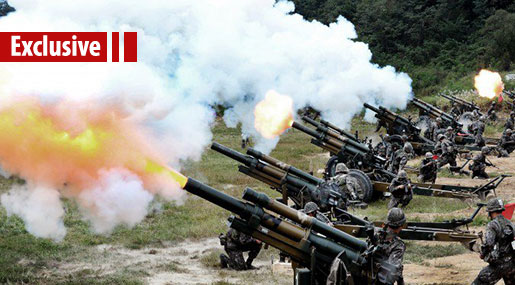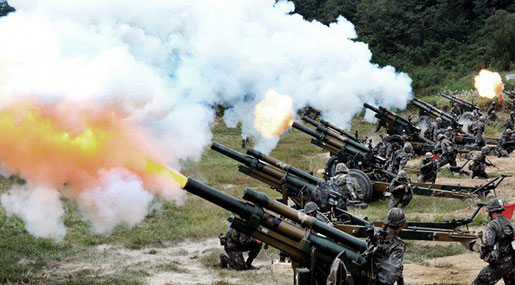
Who Needs a War on the Korean Peninsula?

Darko Lazar
In his book, ‘Destined for War: Can America and China Escape Thucydides' Trap?', political scientist Graham T. Allison argues that Washington and Beijing are headed toward a conflict that neither of them wants.

According to the Harvard professor, Thucydides' Trap is "a deadly pattern of structural stress that results when a rising power challenges a ruling one."
Allison explains that while a direct military confrontation between the US and China over territorial disputes in the South China Sea or Taiwan's aspirations for statehood may be undesirable and unwise, it is not unthinkable.
But in listing all of the potential triggers for a war between the two superpowers, Allison neglects to mention North Korea.
A bloody history
In the 1950s, China was hardly the power that it is today.
However, despite all the difficulties that it had faced and the fact that Beijing had disagreed with Kim Il-sung's decision to invade South Korea, the founder of modern-day China, Mao Zedong, would not allow his fellow communist neighbors to fall into the hands of the Americans.
Nobody could have imagined that a country emerging from the ashes of a devastating war and a government that barely had control over its own territory could stand up to a superpower that just dropped two atomic bombs in next-door Japan, bringing Tokyo to its knees.
Few could have predicted, chief among them US general Douglas MacArthur, that the Chinese would force the Americans back to the 38th parallel so quickly.
Although the borders remained unchanged after the guns fell silent, the Korean War came at a cost of 3 million lives, 2.5 million of which were civilians.
During the three-year conflict, the Americans dropped more bombs on North Korea than on the entire Pacific region throughout their war against the Japanese.
According to the head of the US Strategic Air Command at the time, the American military campaign was responsible for the slaughter of 20% of Korea's population.
"We went over there and fought the war and eventually burned down every town in North Korea... and some in South Korea too... over a period of three years or so, we killed off - what - twenty percent of the population of Korea," General Curtis LeMay bragged in 1984.
Dean Rusk, a supporter of the war and later US secretary of state, got biblical, saying that the US bombed "everything that moved in North Korea; every brick standing on top of another".
Ironically, today, western officials like US National Security Advisor H.R. McMaster, accuse the North Korean leader Kim Jong-un of "brutality" and "unpredictability". So-called analysts and humanists in the west are always on hand to support those assertions, failing to mention that given Korea's bloody history, Pyongyang has about 3 million reasons to be both brutal and unpredictable.
A nuclear deterrent
Pyongyang's "behavior" over the last couple of decades is very similar to that of a rattlesnake; it waves its tail around to ward off potential aggressors but it doesn't attack unless it feels truly endangered.
In 2001, George W. Bush branded North Korea a member of his so-called "axis of evil", which also included Iraq and Iran.
Iraq - the only country among the three to surrender its weapons of mass destruction program without any security guarantees - was systematically destroyed in the years that followed, starting with a US invasion in 2003.
Iraq's experiences with the Americans told Pyongyang that it must never allow its nuclear program to be compromised, as the last and most powerful line of defense for its sovereignty and security.
From an American/western perspective, it is precisely this sovereign political project, which seeks national development and an independent foreign policy, that is regarded as the biggest threat.
After all, if Washington was really worried about ‘lunatic regimes', then Saudi Arabia would be problem number one.
As far as Pyongyang goes, weapon-rattling and threats are not signs of aggression - but rather part of a defensive strategy.
Russia and China
Perhaps one of the main reasons why Graham T. Allison left North Korea off his list of potential triggers for a US-China war is because the country has long since lost its role as China's buffer zone.
At present, the biggest threats to the region come in the form of nuclear weapons and trade wars, rather than invasions by conventional armies.
Nonetheless, the Americans have still managed to utilize every move by Pyongyang to their own advantage, using the ‘North Korean threat' as an excuse to straighten their military presence in the region.
Moreover, a closer look at North Korea's diplomatic ties with both the Chinese and the Russians reveals that the relationship is not exactly at an all-time high. This may have given Washington the impression that a more permanent rift between the three allies is a possibility.
Both Moscow and Beijing are increasingly concerned about Pyongyang's nuclear and missile capabilities, as well as Kim Jong-un. Both countries worry that the young leader may indirectly undermine their geopolitical interests on the Korean Peninsula.
That said, the biggest threat will always be the United States. And when it comes to confronting the American military, China, Russia and North Korea will act coherently as a unified entity.
This much was on display as Donald Trump issued his ultimatums to the Chinese and as the USS Carl Vinson aircraft carrier strike group moved into the Korean peninsula. China and Russia quickly deployed spy ships to welcome the US fleet, as well as tens of thousands of troops to their borders with North Korea.
Needless to say, any further complications in the Pacific region will be unwelcome news in Beijing and Moscow.
Russia and China must perform a delicate balancing act between getting a ‘mischievous' neighbor to listen, and protecting it from an increasingly aggressive Pentagon.
Ultimately, the Pentagon's true aims are hardly focused on Pyongyang, but are rather much more concerned with what Moscow and Beijing are up to.
Meanwhile, and contrary to portrayals in the mainstream media, war has always been the worst possible course of action for the North Korean leadership. Irrespective of the fact that the Kim dynasty is supposedly full of "eccentrics", Kim Jong-un and his predecessors are not uncalculating fools. They know full well that a war can only result in the destruction of their country and likely the end of their rule.
In Washington, on the other hand, wars have a miraculous effect on approval ratings, and furthering the corporate interests that fuel them. If past experiences are anything to go by, the real ‘lunatics' are not sitting in Pyongyang.
Al-Ahed News



